



[TOKYO, JAPAN, 6 July 2012]
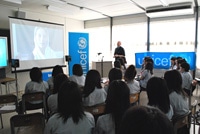 |
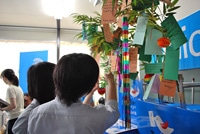 |
On Thursday, 5 July 2012 high school students from Iwaki City, Fukushima Prefecture reunited with high school students from the Afghanistan capital Kabul for a joint class. It has been nearly a year since the students first met directly following the Great East Japan Earthquake in March 2011. Since then the students have maintained contact by exchanging letters.
After the Great East Japan Earthquake UNICEF receive more than 2,000 messages of support and encouragement for children in the affected areas. The messages were written by children from over 30 different countries and regions around the world. The UNICEF Tegami Project has formed ties between children around the world by delivering letters written by children in various countries to children in the affected Tohoku areas. On this occasion Yumoto High School of Fukushima Prefecture served as the stage for one of UNICEF's joint classes. In July 2011, the students of Yumoto High School exchanged letters with students at Tajwar Sultana High School in Kabul, a school built under cooperation between the Government of Japan and UNICEF. During the joint class held yesterday, the students, whose communication had been limited to letters until now, were able to "reunite" with their pen pals in Kabul. What is more, using the Google+ Hangout video chat platform, this time they were able to see and talk with each other for the first time face-to-face.
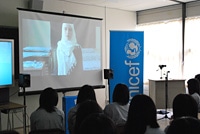 |
The Japanese students greeted their Afghani friends with a big "Assalamu alaikum!" ("Hello" in Dari), and the Afghani students replied with a cheerful "Konnichiwa!" The chat session started with cheers and applause from students on both sides. Next, Yukari Anzai, a second-year English major at Yumoto High School, reflected on her experience assisting a city junior high school following the disaster: "It was very painful to watch people suffering as they sought help. The disaster made me realize how blessed we are every normal day of our lives." Then Samia, a student at Tajwar Sultana High School, talked about the meaning of learning: "School is a safe place where students and teachers come together. If you come to school you will be able to study many things that will benefit you in the future. I hope to continue studying at our school." The students then answered each other's questions about what they enjoyed about school and what kind of foods they like. The students seemed a bit shy at first, but they soon opened up and engaged in a cheerful discussion with their international friends.
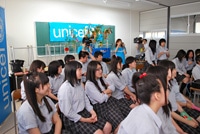 |
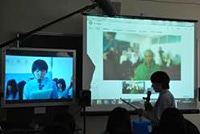 |
During their video chat session the children discussed various topics from the children's perspective, including the challenges faced during conflict and disaster, the role of schools during crises, the challenges to reconstruction in Afghanistan and Japan and their hopes for the future, and then the children delivered a message to the adults.
The discussion held in the joint class will be a significant contribution to the children's future. On Sunday, 8 July the Tokyo Conference on Afghanistan is to be jointly chaired by the Government of Japan (Foreign Minister Koichiro Gemba) and the Afghanistan Government (Minister of Finance Hazrat Omar Zakhilwal and Minister of Foreign Affairs Zalmai Rassoul). In order to appeal to the importance of continuing construction efforts in Afghanistan from the children's perspective, the Japan Committee for UNICEF (JCU) and the UNICEF Tokyo Office decided to conduct the joint class using video conferencing. The class was held over the Internet, bringing together classrooms in Fukushima and Afghanistan. This relationship was developed through the UNICEF Tegami Project, a part of JCU's assistance in response to the Great East Japan Earthquake.
UNICEF Afghanistan Office staff Peter Crowley was in Japan for the Tokyo Conference on Afghanistan and joined the event at Yumoto High School. In Afghanistan, Minister of Education Ghulam Farooq Wardak and Deputy Chief of the Mission to Afghanistan Seiji Okada joined the event at Tajwar Sultana High School. During the joint class the representatives listened to the wishes and messages of the children. Later, while the children engaged in discussion, in Tokyo UNICEF Goodwill Ambassador Tetsuko Kuroyanagi and UNICEF Tokyo Office Director Kunihiko Chris Hirabayashi paid a courtesy visit to Foreign Minister Koichiro Gemba to relay the children's messages.
Coincidentally, the event fell just two days before Tanabata, the Japanese star festival. For the star festival people write their wishes on these tanzaku paper strips and then attach them to bamboo grass in hopes that they will come true. On this occasion, the Afghani children presented the Japanese children with tanzaku that included messages of support, as well as their wishes for reconstruction and the future. The girls' tanzaku decorated their classroom during the video chat. After the chat session concluded, students from Yumoto High School made tanzaku for the students in Afghanistan. These tanzaku were taken back to Afghanistan by UNICEF Afghanistan office representative Peter Crowley where they will be delivered to the students at Tajwar Sultana High School.
Scenes from the joint class will be broadcasted tonight at 22:00 on NHK BS-1 "World Wave Tonight".
*Kindly note that broadcasting time and content can change without prior notice.
All photo credits: © Japan Committee for UNICEF